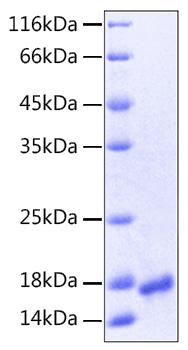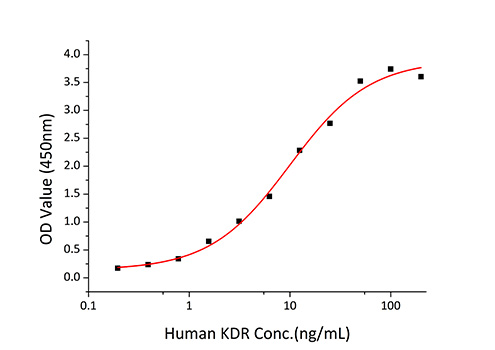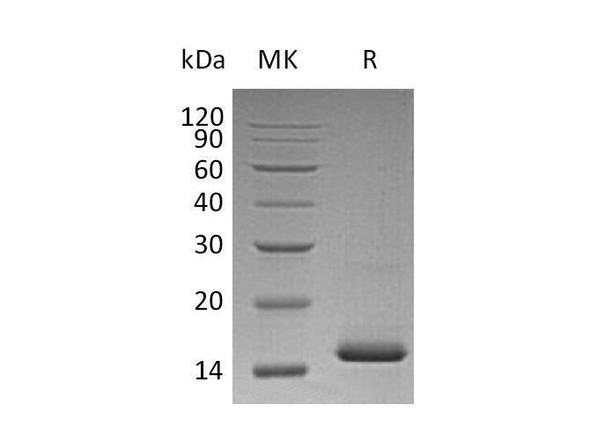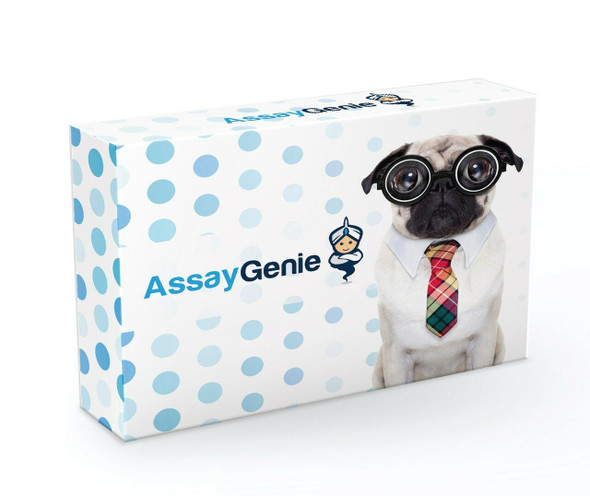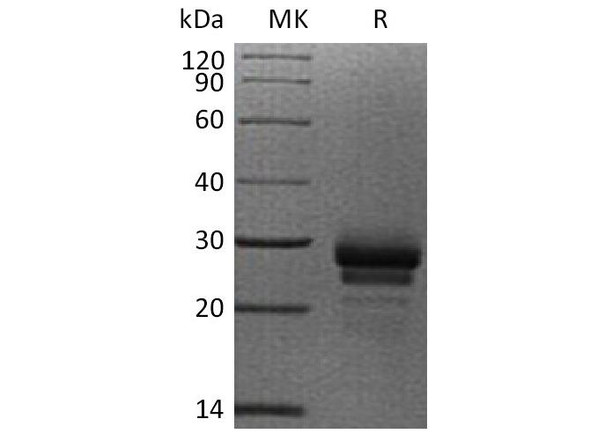Description
Recombinant Human VEGF-A/VEGF121 (K321N) Protein
The Recombinant Human VEGF-A/VEGF121 (K321N) Protein is a biologically active recombinant protein that plays a significant role in various cellular processes and signaling pathways in human biology. This protein is widely employed in immunological research, cell biology studies, protein-protein interaction analyses, and therapeutic development, providing researchers with a reliable tool for investigating VEGF-A/VEGF121 (K321N) function and its implications in health and disease.
This product (SKU: RPCB0131) is produced using E. coli and features a No tag tag for convenient detection and purification. The protein exhibits a calculated molecular weight of 14.06 kDa with an observed molecular weight of 18 kDa under denaturing conditions, achieving ≥ 95 % as determined by SDS-PAGE.. Functional bioactivity has been validated through rigorous quality control assays, confirming its suitability for demanding research applications.
Key Features
| High Purity by Affinity Chromatography | |
| Mammalian & Bacterial Expression Systems | |
| High lot-to-lot consistency via strict QC |
| Product Name: | Recombinant Human VEGF-A/VEGF121 (K321N) Protein |
| SKU: | RPCB0131 |
| Size: | 10 μg , 20 μg , 50 μg |
| Reactivity: | Human |
| Synonyms: | VEGFA, MVCD1, VEGF, VPF, vascular endothelial growth factor A, MVCD1, VEGF, VPF, L VEGFA, VEGF A |
| Tag: | No tag |
| Expression Host: | E. coli |
| Calculated MW: | 14.06 kDa |
| Observed MW: | 18 kDa |
| Gene ID: | 7422 |
| Protein Description: | High quality, high purity and low endotoxin recombinant Recombinant Human VEGF-A/VEGF121(K321N) Protein (RPCB0131), tested reactivity in E. coli and has been validated in SDS-PAGE.100% guaranteed. |
| Endotoxin: | < 1 EU/μg of the protein by LAL method. |
| Purity: | ≥ 95 % as determined by SDS-PAGE. |
| Formulation: | Lyophilized from a 0.22 μm filtered solution of 20mM Tris, 100mM NaCl, pH 8.0.Contact us for customized product form or formulation. |
| Bio-Activity: |
|
| Reconstitution: | Centrifuge the vial before opening. Reconstitute to a concentration of 0.1-0.5 mg/mL in sterile distilled water. Avoid vortex or vigorously pipetting the protein. For long term storage, it is recommended to add a carrier protein or stablizer (e.g. 0.1% BSA, 5% HSA, 10% FBS or 5% Trehalose), and aliquot the reconstituted protein solution to minimize free-thaw cycles. |
| Storage: | Store at -20℃.Store the lyophilized protein at -20℃ to -80 ℃ up to 1 year from the date of receipt. After reconstitution, the protein solution is stable at -20℃ for 3 months, at 2-8℃ for up to 1 week. |
This protein is a member of the PDGF/VEGF growth factor family. It encodes a heparin-binding protein, which exists as a disulfide-linked homodimer. This growth factor induces proliferation and migration of vascular endothelial cells, and is essential for both physiological and pathological angiogenesis. Disruption of this gene in mice resulted in abnormal embryonic blood vessel formation. This protein is upregulated in many known tumors and its expression is correlated with tumor stage and progression. Elevated levels of this protein are found in patients with POEMS syndrome, also known as Crow-Fukase syndrome.


